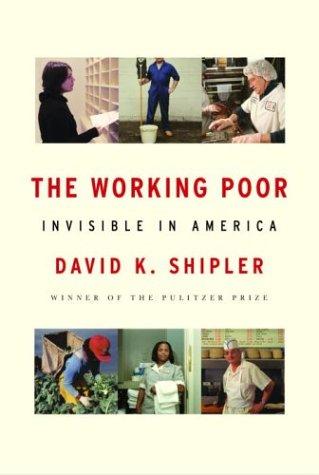In a searing portrait of America beneath its golden surface, author David K. Shiper lays bare the lives of the poverty-stricken people who are essential to our affluence but utterly bypassed by it.
The Working Poor” invisible in America (Alfred A. Knopf New York, 2004) is a non-sentimental yet riveting journey through hopelessness. The book points out there are 35 million people in our daily line of vision—the guy who parks our car, the one who rakes the leaves, the cleaning lady who comes to our home, the stock boys who shelve groceries, the clerk behind the U-Haul desk—who work every day but languish in life. There are 12.1 million households unsure they can afford enough to eat. Those are huge numbers in this wealthy country of ours.
“Poverty is like a bleeding wound,” says Shipler. “It weakens the defenses. It lowers the resistance. It attracts predators. It almost seems as if business and government conspire to spate the working poor from their meager cash.”
Shipler highlights how the financial services industry does little to help the poor and in fact promotes a nearly inescapable circle of high fees and rates. Lenders search credit ratings for delinquencies, label you sub-prime and charge higher interest rates. H& R Block, a seemingly respectable business, helps ill-informed and uneducated taxpayers file returns by charging overpriced fees for forms and filing and disingenuously advertised ‘rapid refunds’. Foreigners working here who send money home, to say Mexico, lose 10% to 25% by unconscionable fees and unfavorable exchange rates at the banks, drug stores and Western Union offices that handle the transaction.
Corporate greed is also an overwhelming factor that keeps people in low-wage jobs, according to Shipler. A garment worker in California is paid three-quarters of a center for each zipper sewn by machine into a pair of jeans. To make seventy-five cents she must sew 100 zippers. Another gets four cents to put a label on a pair of pants. Worker advocates say that when the minimum wages goes up, the employer often raises the required speed of production but not the rate paid per piece. Many employers are immigrants taking advantage of more recently arrived immigrants from their own countries.
A Wal-Mart in New Hampshire starts employees at $6.25 an hour, pays one dollar more for the nighttime shift, which is not nearly worth the value of employees’ flexibility to store that stays open all night, and an extra twenty-give cents for cashiers. In an insidious revelation the manager acknowledged that though he won’t, he could raise salaries to $8.00 an hour without damaging, or even changing the store profits. “We’d have to cut corners on other things like…we may not be able to put all the pretty balloons up all over the store,” he said.
In the fields of North Carolina migrant workers spend the day picking fruits and vegetables for maybe forty cents for a bushel-sized bucket. One man from Mexico said he could sometimes fill thirty buckets in an hour. The contractor who hired and paid him changed unconscionable deductions from his daily pay for rent in a dark, wretched, stifling cinder-block structure with rusty bed frames, soiled and stinking mattresses, windows without screens and a row of toilets without partitions.
Shipler says that capitalist free enterprise “has ruthlessness about it, a cold, competitive spirit that promotes the survival of the fittest and the suffering of the weak.” The resulting working poverty is a complex web of adverse circumstances for which there is not just one solution.
“It’s not just low wages but also low education, not just dead-end jobs but also limited abilities, not just insufficient savings but also unwise spending, not just poor housing but also poor parenting, nut just lack of health insurance but also lack of healthy households,” concluded Shipler.
We must do more for those who desperately need help making it. And in the end we must judge our society and ourselves not by the glamour and money at the top but by the lack of it at the bottom. The medieval theologian Thomas Aquinas said, “Greed is a sin directly against one’s neighbor since one man cannot over-abound in external riches, with-out another man lacking them.” Shipler says simply, “It is time to be ashamed.”




